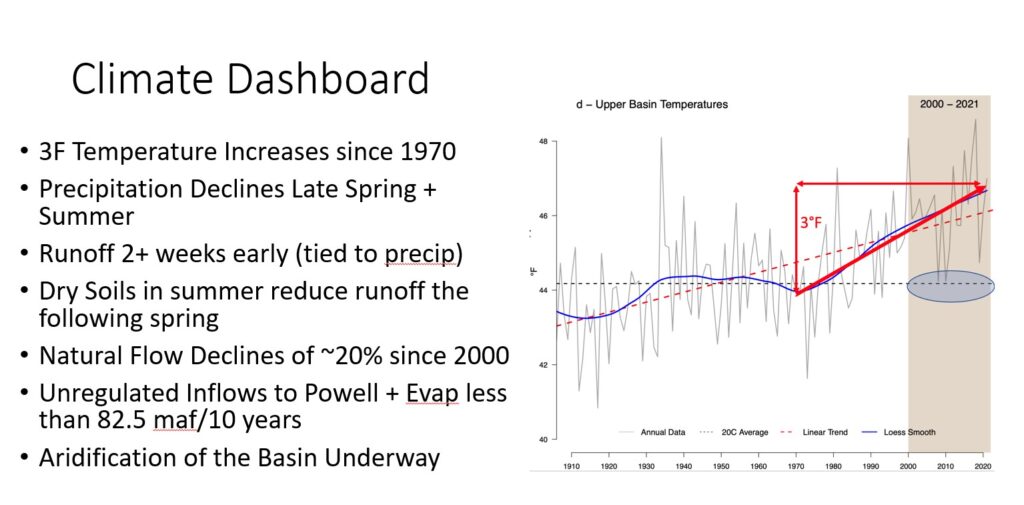
The Drying of the Colorado River Basin, slide from Brad Udall
The only lever we currently control is the demand lever.
– Brad Udall, Stegner Colorado River Symposium, March 18, 2022
Colorado State University climate researcher Brad Udall poked again last week at a question he’s been thinking and speaking about for the past year – the knock-on effects of summer warming in the Colorado River Basin.
Precipitation declines in late spring and summer, combined with summer warming, are leaving us with dry soils as we head into the winters that follow. Which means less runoff in the basin.
His talk included a graph of new modeling being done by a group of Colorado River researchers. Under a continuation of the hydrology we’ve had for the past two decades, the total storage of Lake Mead and Lake Powell bumps along at basically empty for the foreseeable future.
And Brad, a scientist whose work more than most straddles the scientific and policy worlds, shared his “biggest fear” – that it’s easier for basin managers to let the system crash than to make the hard choices needed to avoid that crash.

I am at the moment attending the 12th Hydrogeological Conference taking place in Nicosia, Cyprus. There have been a few papers analyzing climate trends statistically using the Mann-Kendall and Sen’s slope test. I am unaware of climate researchers using these methods in the U.S. and in particular in New Mexico. The tests are applied to any time series parameter including chemical analysis of water to precipitation and temperature, stream flow, et al.. The methods are set out in Statistical Methods in Water Resources by Helsel D.R. and Hirsch, R.M. or pubs.usgs.gov/twri/twri4a3/twri4a3.pdf if I’ve gotten that right.
Additionally, there is at least one paper on the Copula Method of relating two variable over time. First time I am learning of this method also. For example, precipitation v. soil moisture or v recharge. Have never heard it used in all of the presentations I have heard in New Mexico.
Trying to control our water resources from the supply side is absolutely futile: it leads to trickle down rivers. It has been this way in the past and will most certainly be in the future. Controlling our water supply from the demand side is the only sensible pathway forward. We do this with gasoline and electricity and bread. For example, every household and every farm that feeds off the Colorado river basin gets 100 gallons of water per day for a very minimal cost. Then the rest of the usage is priced according to demand. No one has ever made a good case for, “but I deserve cheaper electricity”
I think it is likely that people who manage public programs arrive in their jobs, to a large extent, for a strong trait to get along well with others. But at some time the external circumstances will change in a way that requires more inspired leadership. We can all think of examples. Big car companies that lost huge market share to the foreign companies. Kodak that couldn’t adjust to digital photography. Colleges that didn’t accept diversity. Sports teams that wouldn’t accept diversity and changes in the style of play.
We are now deep into our world’s biggest challenge; warming. Most of our political leaders refuse to react and do what is needed. Brad’s comment is tragically exactly right: “…that it’s easier for basin managers to let the system crash than to make the hard choices needed to avoid that crash.” This is the “writing on the wall”.
Ford was losing money so they hired Allen Mulally from Boeing for CEO and he turned the company around. Mulally had a reputation for getting the data to know the problem and how to fix it. The Colorado River needs a guy like that.
Right now.
I am nobody in the world of the Colorado River. But my advantage is I’m on the outside looking in. I have no vested interest other than I’m one of 40 million users.